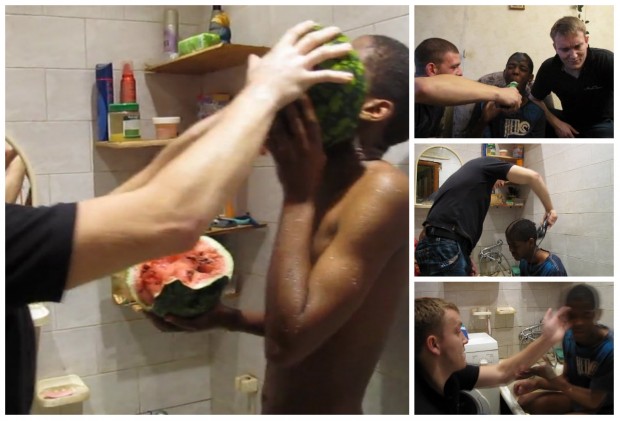There are several important stories today that may or may not be making the Russian press, but need to be highlighted. We’ll be doing regular rolling updates throughout the day. – Ed.
Russian University Students Consider Themselves “European”: The Russian expert Paul Goble sites a study that suggests that many university students identify themselves as European, despite the best efforts of the Kremlin to move away from the European identity in favor of a Russocentric worldview (see previous update below):
More than two-thirds of university students in northwestern Russia identify as Europeans, nearly half would like to live in a Unified Europe, and only about one in six want to become part of the Eurasian Union, a pattern that suggests Vladimir Putin’s efforts to archaize the country will fail in the future or that another divide will open within it.
This study suggests that the educated future elite of Russian society may have a very different point of view than the current President’s. However, Goble reports that the Kremlin is responding to this by installing officers in the unversities to ensure “‘ideological’ correctness,” in order to counteract these mindsets.
Ukrainian Firm Stops Buying Russian Natural Gas: The company Naftogaz of Ukraine has completely stopped buying gas from the Russian giant, Gazprom. The announcement comes as another chapter of Russia’s trade war with former Soviet states appears to be expanding.
At the root of the trade war, several former Soviet republics, including Ukraine, have expressed interest in joining the European Union. Russia, however, not wanting to dump its protectionist policies or be lumped in with the developing European identity, has forgone membership in the EU in order to pursue an alternative, the Customs Union. As the Customs Union struggles to compete, however, more republics have indicated that they will not join the CU but will instead join the EU. Russia has responded to this by closing the border with Ukraine and banning a slew of foreign products, from Lithuanian dairy products to Moldovan wine, just to name two. Ukraine has born the brunt of this dispute because for years it controlled the gas pipelines that allowed Russian gas to enter the rest of Europe. Now, Russia is looking for other conduits, and Ukraine is looking to turn away from Moscow and towards Brussels.
Just last week, it looked as though Russia might be softening these policies, as the primary architect of this strategy was dismissed. However, by the end of the week Russia announced that it was requiring Ukraine to pre-pay for gas, and it could turn the gas off all together. It appears as though the Ukrainian firms have taken the first step.
Still, there is now concern that Europe will face a gas shortage. In 2009, a dispute over gas meant that thousands of homes across Europe were without heat at the height of winter.
Russia Bans Cell Phone Photos or Video at Sochi Olympics: Journalists, who already have to pass a very strict accreditation process in order to cover the Sochi Winter Olympics at all, will not be blocked from using cell phones, tablets, or any other “non-professional” device to capture video or pictures. Buzzfeed reports:
Vasily Konov, head of the state-run R-Sport news agency, which controls accreditation at February’s games, told a seminar for sports journalists on Friday that print reporters using any sort of multimedia would be “considered a serious violation and lead to their accreditation being canceled,” several Russian outlets reported. Only journalists with professional equipment and special badges will be allowed to do so.
What are the real-world implications of this decision? Well, clearly the rule has less to do with what is happening inside the arenas and on the slopes (the events will be well covered by “professional” cameras) and more to do with what is happening elsewhere, away from the cameras. Journalists may now have to fear that even using a cell phone or sending tweets without pictures or videos could draw the ire of officials. This could have an extremely chilling effect on an Olympic games where sporting events are not the only stories in need of covering.
Gay Student Tortured on Video: Human rights activists are reporting that a Russian neo-Nazi group kidnapped, humiliated, and tortured a young South African student who also happens to be gay. For hours, they shaved and dyed his hair, made him perform oral sex with fruit and a beer bottle, and ultimately forced him to flash neo-Nazi hand signals.
The student, identified as 20 year old South African national David Smith, filed a complaint to police, but has since been expelled from his university.
Hate crimes are on the rise across Russia, and the severity of the hate is also increasing:
According to a news release from the Sova Center which tracks violence in Russia, in October 2013, over 20 people were injured in racist and neo-Nazi attacks, two of them fatally. They also report that since the beginning of the year, racist violence has killed 18 people in Russia and injured 141. In its travel advisory, the State Department says non-white Americans have been “victimized in violent attacks by ‘skinheads’ or other extremists.”
More pictures, and a disturbing video, of the beating, verbal assault, and physical humiliation, as well as reports of similar incidents, can be found here.
